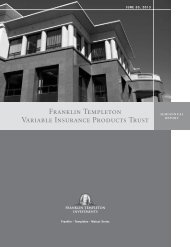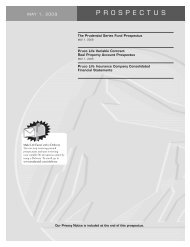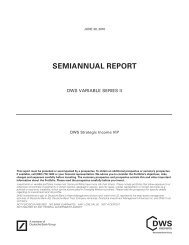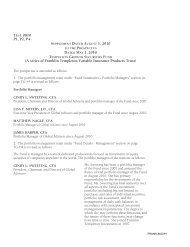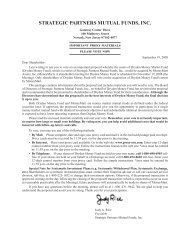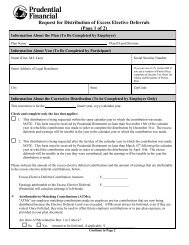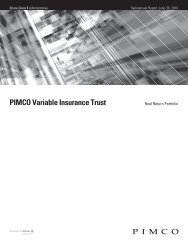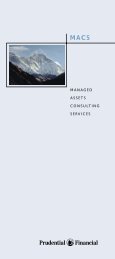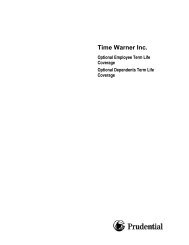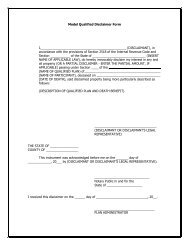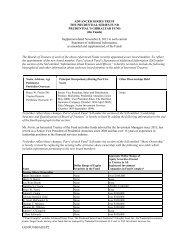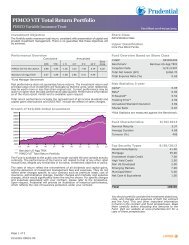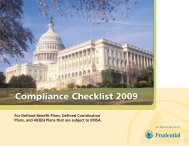Advanced Series Trust AST Academic Strategies Asset ... - Prudential
Advanced Series Trust AST Academic Strategies Asset ... - Prudential
Advanced Series Trust AST Academic Strategies Asset ... - Prudential
You also want an ePaper? Increase the reach of your titles
YUMPU automatically turns print PDFs into web optimized ePapers that Google loves.
investment category in foreign securities, which are those securities denominated in a foreign currency. American Depositary<br />
Receipts (ADRs) may be purchased for the Portfolio and will not be considered foreign securities for the purposes of the 15%<br />
limitation stated above. In selecting investments for the Portfolio, Marsico uses an approach that combines “top-down” macroeconomic<br />
analysis with “bottom-up” stock selection.<br />
The “top-down” approach may take into consideration macro-economic factors such as, without limitation, interest rates, inflation,<br />
demographics, the regulatory environment, and the global competitive landscape. In addition, Marsico may also examine other<br />
factors that may include, without limitation, the most attractive global investment opportunities, industry consolidation, and the<br />
sustainability of financial trends observed. As a result of the “top-down” analysis, Marsico seeks to identify sectors, industries and<br />
companies that may benefit from the overall trends Marsico has observed. Marsico then looks for individual companies or securities<br />
with earnings growth potential that may not be recognized by the market at large. In determining whether a particular company or<br />
security may be a suitable investment, Marsico may focus on any of a number of different attributes that may include, without<br />
limitation, the company’s specific market expertise or dominance; its franchise durability and pricing power; solid fundamentals (e.g.,<br />
a strong balance sheet, improving returns on equity, the ability to generate free cash flow, apparent use of conservative accounting<br />
standards, and transparent financial disclosure); strong and ethical management; commitment to shareholder interests; reasonable<br />
valuations in the context of projected growth rates; and other indications that a company or security may be an attractive investment<br />
prospect. This process is called “bottom-up” stock selection. As part of this fundamental, “bottom-up” research, Marsico may visit<br />
with various levels of a company’s management, as well as with its customers and (as relevant) suppliers, distributors, and<br />
competitors. Marsico also may prepare detailed earnings and cash flow models of companies. These models may assist Marsico in<br />
projecting potential earnings growth and other important company financial characteristics under different scenarios. Each model is<br />
typically customized to follow a particular company and is generally intended to replicate and describe a company’s past, present<br />
and potential future performance. The models may include quantitative information and detailed narratives that reflect updated<br />
interpretations of corporate data and company and industry developments.<br />
Marsico may reduce or sell portfolio securities if, in its opinion, a company’s fundamentals change substantially, its stock price<br />
appreciates excessively in relation to fundamental earnings growth prospects, the company appears not to realize its growth<br />
potential, or there are more attractive investment opportunities elsewhere.<br />
The core investments for this investment category generally will be comprised of established companies and securities that exhibit<br />
growth characteristics. However, these investments also may typically include companies with more aggressive growth<br />
characteristics, and companies undergoing significant changes (e.g., the introduction of a new product line, the appointment of a<br />
new management team or an acquisition).<br />
U.S. Large-Cap Value (T. Rowe Price). T. Rowe Price will invest primarily in common stocks of large U.S. companies that appear to be<br />
undervalued, and in securities that are expected to produce dividend income. T. Rowe Price also may invest up to 10% of the assets<br />
attributable to this investment category in foreign securities. T. Rowe Price typically will employ a “value” approach in selecting<br />
investments for the domestic large-cap value portion of the Portfolio. T. Rowe Price’s in-house research team seeks to identify<br />
companies that appear to be undervalued by various measures and may be temporarily out of favor but have good prospects for<br />
capital appreciation and dividend growth.<br />
International Growth (William Blair). William Blair will use fundamental research to identify stocks of foreign companies with market<br />
capitalizations over $100 million that have above-average prospective growth, evidence of sustainability of future growth, aboveaverage<br />
profitability and reinvestment of internal capital, and conservative capital structure.<br />
International Value (LSV). LSV will employ a proprietary model and other quantitative methods in an attempt to pick undervalued<br />
foreign stocks with high near-term appreciation potential. Cash flow-to-price ratios, book-to-market ratios and certain past<br />
performance measures are some of the important variables reviewed by LSV in its investment process.<br />
U.S. Fixed-Income (PIMCO). Under normal circumstances, PIMCO will invest primarily in a diversified portfolio of fixed-income<br />
instruments of varying maturities. The average portfolio duration for securities held in this investment category will normally vary<br />
within two years (plus or minus) of the duration of the Barclays Capital U.S. Aggregate Bond Index. PIMCO will invest primarily in<br />
fixed-income securities that are rated investment grade by established rating services but may invest up to 10% of the total assets<br />
attributable to this investment category in junk bonds. PIMCO may also invest up to 10% of the total assets attributable to their<br />
investment category in preferred stock.<br />
Hedged International Bond: Developed Markets Sub-category and Emerging Markets Sub-category (PIMCO). The Hedged<br />
International Bond investment category will contain a Developed Markets sub-category and an Emerging Markets sub-category.<br />
PIMCO will be responsible for allocating assets between the Developed Markets sub-category and the Emerging Markets subcategory.<br />
Emerging markets include those in countries defined as emerging or developing by the World Bank. Remaining markets will<br />
208



